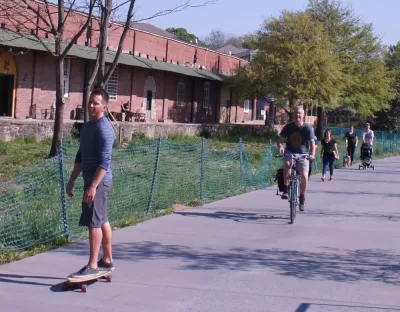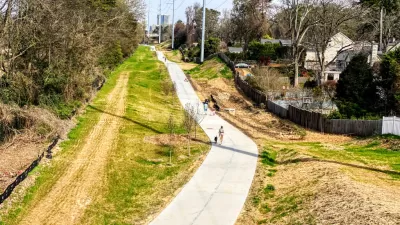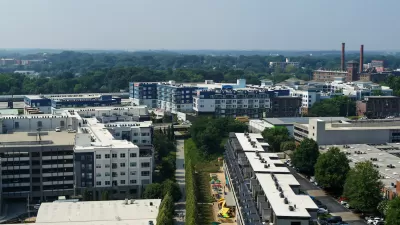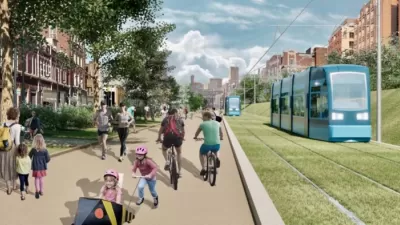In an interview, Atlanta BeltLine visionary Ryan Gravel discusses the ongoing project and how it fits an emerging, multidisciplinary understanding of what good infrastructure can be.

Ryan Gravel is the man who conceived of Atlanta's BeltLine, an "infrastructure corridor" that will loop around the city containing transit, green space, bike/pedestrian paths, and housing. Angie Schmitt writes, "Gravel says what's happening in Atlanta with the BeltLine is part of a bigger shift: taking 20th century infrastructure and repurposing it for 21st century needs."
In the interview, Gravel references his recently-published book, Where We Want to Live. "We're at the beginning of this pretty significant shift that I think is on the order of magnitude of sprawl. We want things to change, we need things to change for our survival, but as they do change we need to be thoughtful about how we do that so that's its equitable."
Gravel emphasizes the people-centered, democratic impetus behind BeltLine. "It wasn't part of some big plan for the city, it came from an academic environment. It didn't come from City Hall and it didn't come from developers, people could just evaluate it. And it's really the public that made the project happen. Because the people of Atlanta fell in love with it."
FULL STORY: BeltLine Visionary: It’s Time to Radically Reconceive Urban Infrastructure

Alabama: Trump Terminates Settlements for Black Communities Harmed By Raw Sewage
Trump deemed the landmark civil rights agreement “illegal DEI and environmental justice policy.”

Study: Maui’s Plan to Convert Vacation Rentals to Long-Term Housing Could Cause Nearly $1 Billion Economic Loss
The plan would reduce visitor accommodation by 25% resulting in 1,900 jobs lost.

Why Should We Subsidize Public Transportation?
Many public transit agencies face financial stress due to rising costs, declining fare revenue, and declining subsidies. Transit advocates must provide a strong business case for increasing public transit funding.

Wind Energy on the Rise Despite Federal Policy Reversal
The Trump administration is revoking federal support for renewable energy, but demand for new projects continues unabated.

Passengers Flock to Caltrain After Electrification
The new electric trains are running faster and more reliably, leading to strong ridership growth on the Bay Area rail system.

Texas Churches Rally Behind ‘Yes in God’s Back Yard’ Legislation
Religious leaders want the state to reduce zoning regulations to streamline leasing church-owned land to housing developers.
Urban Design for Planners 1: Software Tools
This six-course series explores essential urban design concepts using open source software and equips planners with the tools they need to participate fully in the urban design process.
Planning for Universal Design
Learn the tools for implementing Universal Design in planning regulations.
Caltrans
Smith Gee Studio
Institute for Housing and Urban Development Studies (IHS)
City of Grandview
Harvard GSD Executive Education
Toledo-Lucas County Plan Commissions
Salt Lake City
NYU Wagner Graduate School of Public Service





























